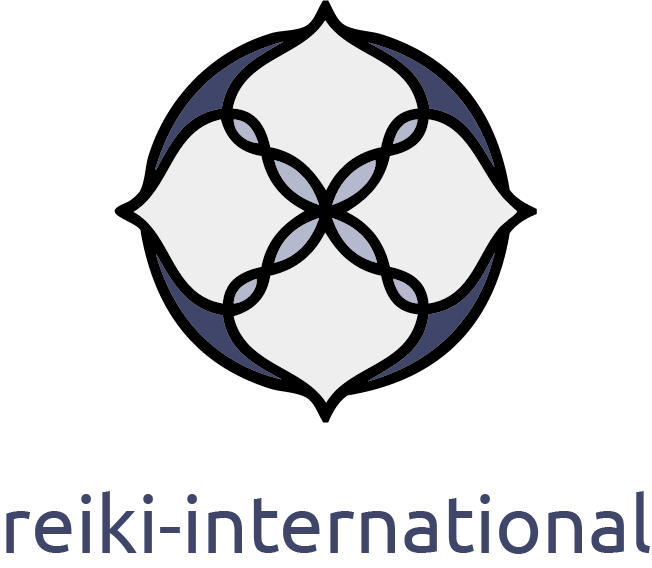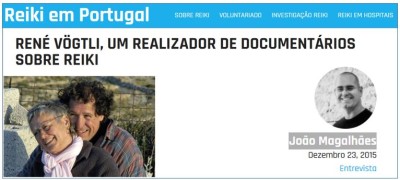For the Newsletter of the Portuguese Reiki Association and with a view to organisational challenges René answered questions about the Network, RIO and the newest Video project. This very personal interview was released in December. To read it in Portuguese you follow this link here.
For English readers who want to know indepth:
You were president of The Reiki Network, also with your wife Mischa. How was that experience?
The Reiki Network is an association for international Reiki Masters. It adheres to and strives towards the highest possible training standards for Reiki Usui Shiki Ryoho; they do not recognise spiritual lineage as does, for example, the Reiki Alliance. From 1996 to 2008 either my wife Mischa or I were in the presidency. We were never together in this role; in the beginning it was me and later it was her. In 2010 we left because of … personal disputes. This probably best describes it. It was painful; it was the failure to resolve disharmonies in relationships.
One has to understand that in 2010 75% of the members were “descendants” of Mischa and me, i.e. they were trained either by us or by Masters whom we had trained. We practiced the Master Training and cultivated the relationships over years and thus you can imagine that stepping away was … a major step.
I explain this because what we experienced in that organisation is typical to what happens in many organisations.
So, “how could it come to a painful ending?” one might ask. And add “amongst Reiki Masters of all people ?!?”. The latter is easier to answer: it is naive to assume that there is only peace and calmness amongst Reiki Masters. The question really is – and I do believe that Reiki Masters deserve particularly stringent scrutiny in this regard: how do we behave when dissonance breaks loose, how do we deal with conflicts, do we have a culture of apologizing and forgiving?
My wife’s and my dominance within the organisation was the direct result of our success: since 1992 we have been working full time and exclusively with Reiki. Many thousands of Reiki students came to our seminars and we gave professional Master Trainings to over 40 people. Naturally, most of them became members of The Reiki Network. Blinded by our own success or maybe simply because of lack of wisdom, we did not recognise the shadow-side of our presence. There is no point in expanding this other than saying that looking back I wish I would have seen it earlier and stepped back from leading positions within the organisation to allow others to unfold more readily.
In hindsight, I would question my interpretation of responsibility then. As president I felt responsible to “lead” and as a senior Reiki Master I felt responsible to “teach”. In principle there is nothing wrong with that. I am a man and feel good in my masculinity. Thus, it is fair to say that my Yang-qualities flavoured my “leadership”, my “teaching”. In a field where most practitioners are woman a conflict might be programmed. Looking back, I wish I had had the oversight to understand this. The gender issue is an interesting one. And I feel it is not yet resolved in many organisations.
I am not sure if I answered your question. Maybe you asked how working so closely together affected our marriage. My wife and I are Reiki Masters in our own right, independent from each other – parallel if you want – and untied in our close cooperation. We are engaged in organisational work as individuals and not as one unit. Of course, we both consult each other – often coming to different conclusions …laugh… As professionals we are partners and our marriage is not a factor that interferes with our work. Of course, in the professional partnership we need to tackle failures or mistakes and be cautious not to let them affect our love-relationship. It is something we manage very well I dare say. True, at the beginning I sometimes was jealous at my wife’s greater success (defined as size of class …). But that is long ago.
My relationship with Mischa goes beyond our individual professions and our own callings in life. As such it is an absolute privilege and a significant support to share with my beloved wife my personal calling which is more than our profession, which too, we share.
Both of you founded the RIO – Reiki International Organization. What are the main objectives?
Very soon after we left The Reiki Network we founded RIO together with two Reiki Master Teachers. The hastiness of this development was probably also because we longed for a new … belonging, a home. Also, it is much in my nature to go full steam ahead once I am committed to something. In such matters patience is not my strong point … laugh.
RIO was never a substitute or competition to any organisation, least of all the one we had left. RIO welcomes Reiki persons of any level, origin or organisational belonging. Anyone. Even “charlatans” can enter. Depending on the service one wants to use there are Code of Conducts which our participants need to adhere to. For example, if someone wants to register an emergency in our Reiki-Chain there are certain conditions (e.g. that the person in need agrees to receive absentee treatments). For the Forum or the Practitioners-List different Code of Conducts rule. Information in the library is open. If a “charlatan” then copies, well, that is just great, we have made a contribution of everyone becoming better informed and trained. RIO is supposed to be a place for meeting, sharing, information and mutual support. Today there are over 300 participants in 16 countries. There is no entry fee; financial contributions are self-determined and voluntary.
The speed with which we founded RIO brought certain problems with it. Burn-out of individuals, financial difficulties just to mention two. Consequently, we changed RIO to the extent that today I am the only executive and have taken over all projects. On my won, of course, I am limited and thus some projects have been put on ice.
Currently the Reiki Help for people in need is the most active service, particularly the “Emergency-Chain”. Our shop is well frequented and the video production is very active. An offspring of RIO whom RIO supports very much has organised internships for Reiki practitioners in the hospital in Berlin (the 5′-Video here). From this emerged a study of Reiki’s effectiveness in a drug centre. The video-interview here. BTW all Videos have English subtitles.
You made an excellent and very credited work with a documentary regarding the practice of Reiki in a clinical environment at the accident hospital in Berlin. What represents this project for you, personally and for the Reiki Community?
In the previous para I referred to the the short version of the video. Those who want to see the (15:40) full length version click here.
I started to make video productions a few years ago. In the beginning, we were mainly documenting meetings, etc. Then I transcribed an excerpt of a German TV documentary shortening it to the Reiki relevant message. And I started to have existing Videos translated into other languages. (e.g. the TV clip about the Spanish Uni-clinic about Cancer). Then I got into portraying Reiki personalities and finally the Swiss group that went to the clinic in Berlin for a Reiki internship, which is what you refer to.
Parallel to the visual we recorded also music and audio-messages, even experimenting to intonate Reiki on a CD, quite an experiment. Thus came about what we now call RIO-Productions (RIO-P).
Pictures say sometimes more than words. And Video is a media of our time. Furthermore, it somewhat relates to the idea of oral tradition. The Berlin Video became the show-piece of RIO-Productions. In the making of it I discovered a completely new side in me: I tapped a pool of creativity which I did not know existed. This is very exciting for me on a personal level. And to do so bedded in what I consider my calling in life and what is also my profession, i.e. the spreading of Reiki, it was just a revelation.
If in addition you now consider that I do the filming with my younger son who is the director of the films, well, you can see why I am so enthused and inspired.
For the Reiki community I hope this video serves as a motivator to all Reiki people. It contains valuable information that should be freely available to all. I would like to see my work as building bridges and this video in particular connects lay Reiki-people to professionals. All too often Reiki-people are full of prejudices towards medicine and science. And vice versa. I hope this video contributes to clearing some of this up.
Furthermore, it is a great door-opener when you speak to sceptical people, be it in the medical field or in business or politics. When they see that a recognised uni-clinic approves of Reiki, they often start to take things seriously. As has happened in the drug institution I mentioned before.
I personally rejoice in one more aspect of this. Have you looked at the credentials of the Video, the list of the sponsors? I am very pleased that parties have sponsored the video who in the past may not have cooperated with each other. This, too, is a kind of building bridges which I see as part of my personal mission.
What feedback had you from it?
There was plenty positive feedback. The Reiki Magazine reported favourably and people talk about it in the community. I believe it is translated into 5 languages. Besides for the content we received lots of praise for the professional quality of the video. The videos is often viewed and collects many likes and is passed around in social media. The sponsors of the video are also very happy and some continue to support my future projects.
I am of course pleased about the feedback but I am also a little distanced to it. Yes, positive feedback is encouraging and shows you what you do well – so that you can do more of this. But I guess it is negative feedback, critical comments which really propel you into new dimensions.
What makes me most happy in this regard is when I see that people pass the video on to each other, recommend it to others. It hasent gone viral yet but … laugh…
Tell us about your newest project in Reiki?
This is a big one. We just filmed in Germany and came to realize that it will probably be at least a 45 Minute Video documentary. It is about a crucial part of the modern Reiki history which frees future generations from carrying unresolved issues of the past. It is exciting … and scary. Scary because the vision behind it is … ambitious, to say the least. It has the working title “Road to reconciliation.”
BTW I am still looking for support: see this video.
Before I continue allow me please to say this: I believe that the most important “project” any Reiki person can have is to practice. As a Reiki Master I feel that what I just did last weekend, i.e. initiating people into Reiki, stands above any film-project I may have.
In the 80ies, after Hawayo Takatas death, a polarisation started in the Reiki community. First it was the Reiki Alliance vs Barbara Webber-Rays school of thought. In the 90ies there was this attempt to register Usui Shiki Ryoho which alienated many. Nowadays some feel that there is a division between what is sometimes called “Western” and “Eastern” Reiki. Such polarisation has made cooperations in the past difficult.
About 5-7 years ago, a change started to manifest itself. I believe that the German association ProReiki is a good example of new and successful cooperation across the divide of Reiki “styles” or origins.
Hawaya Takata may have been controversial and contradictory. But Reiki was popularised by her, she opened the doors. Fact is that everything we know today of Reiki was initiated by her work. And that includes the revival and popularisation of “Eastern” Reiki. Without Takata there would be none of us in the Reiki world. One has to remember that the remnants in Japan were isolated, small and secret until the time Reiki people form the West – descendants of Takata – unearthed them.
One of the last living witnesses of that time and one and that is still active today is Takata’s grand-daughter Phyllis Lei Furumoto. She is very centrally involved in the unfolding of Reiki’s history from the 80ies until today.
The heart of “Road to Reconciliation” will be an in-depth interview with Ms Furumoto. The views of other protagonists will be incorporated as well as historic film material.
The aim of the movie is to resolve unclarities ending with a sense for … or even better ending with reconciliation. To aid and inspire future Reiki generations.
What are your biggest challenges to make this project a reality?
First we needed to ensure Ms Furumotos participation. I made it clear that this will not be a propaganda movie for her or the Reiki alliance, that it will be a journalistic documentation. That I needed independence and to remain critical. I did not know her personally, I am not in the Alliance and thus it is not at all self-understood that she entered into this adventure. My Master student Dr. David Bolius who had met Ms Furumoto was instrumental to getting the two of us together.
Then there is the financing. We all agreed that if I would not find sponsors for a minimum amount of € 10’000 before the summer it would be a sign that the project need not be. We received that amount but I am still seeking further financial support. If any readers can share the enthusiasm for this important work, please do contact me. There is still room for your name in the credentials at the end of the movie.
The biggest challenge though was the discovery how strong some sentiments are. Frankly, it was a bit of a shock. It still baffles me to see how ill feelings over relatively trivial matters are perpetuated over such a long period of time. And how contradictory that is to Reiki, to healing and forgiving which is being taught by the very same people. The rigidity I encountered in some really made me wonder if the objective of the movie – reconciliation – can at all be achieved. Of course, it also showed me how very important therefore the movie is.
A challenge I continuously need to be cautious of is to maintain a distance to the subject matter. Not to inject my own preferences, my own judgments or even my personal issues into my work. It is an illusion to think one can stay neutral. But to stay alert about the loopholes of one’s own subjectivity is an imperative and a challenging responsibility for a journalistic endeavour.
Another challenge is my own insecurities. I am aiming at a professional documentary but I am an autodidact. Can I do this, can I live up to it? And a further personal challenge is to work with one’s own son. Does our relationship interfere? Will I be able to allow him the necessary space? The latter has worked exceedingly well in Berlin, I am pleased to say, and has filled both of us with a particular joy which is a bonus we would not have if we were strangers working together. This shows that challenges are also opportunities.
How do you think it can bring a new look at Reiki and everybody that practices it?
I guess I have already addressed this question. Healing, holistic healing in particular, is the aim of Reiki. This includes forgiving. If the movie can show how the present generations are attempting, better: if one can see forgiving in motion, well, then I believe we have made a case-study which has impact not only on future Reiki generations but beyond that. And if not we, we the Reiki people, then who would do this, this act of letting go, this forgiving, this reconciliation?
What are your best wishes for Reiki? And share with us a message to the Portuguese readers.
I guess my answer to your question about best wishes is contained in the foregoing comments of mine.
While I wrote I was very much aware that this is for the Portuguese Reiki community. In that sense I have already addressed your question. But maybe I add this:
My impression of the Portuguese people is that they are very ….”civilised”. What I mean with that is, that in my visits in your country and in many encounters in Switzerland and former colonies, I felt that in the reserved politeness and humbleness of the Portuguese and in the calm, which is sometimes is characterised as melancholic, I believe that a profound cultural heritage resonates. It contains a sense of responsibility which I applaud and in the context of Reiki am most grateful that it manifests in such wonderful developments as your association- and communal work. Thank you very much for that.
I am not sure about the last paragraph, it is rooted in a very personal and limited view, it is almost presumptuous of me particularly because the choice of words is bound to be too poor for the message they should carry.


